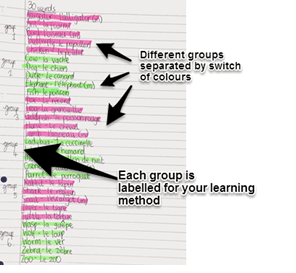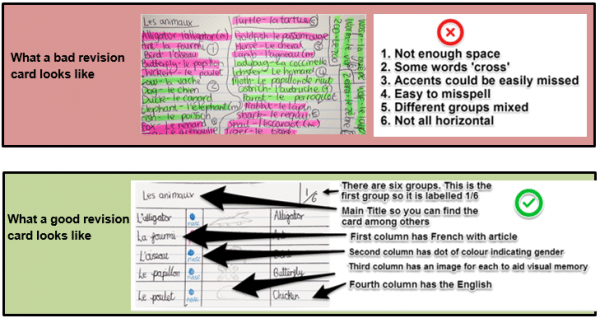Frederic’s note: This article was written by Jack Nunn, who was kind enough to share his experiences about learning French vocabulary efficiently. He explains how he does it by taking into account the specificity of the French language (the gender issue).
If you have some tips about learning French and want to write about it, feel free to email me at contact@talkinfrench.com.
If your article is relevant and useful I will share it with great pleasure on the website.

« Je suis comme ça. Ou j’oublie tout de suite ou je n’oublie jamais, » was famously quoted by Samuel Beckett, an Irish avant-garde playwright who was awarded the Nobel Prize in Literature in 1969.
It translates as “I’m like that. Either I forget right away or I never forget,” and this perhaps highlights the importance of learning vocabulary in a language. Learning the estimated 600 words, which represent about 90% of words used in common French texts, may be difficult to retain in your long term memory.
This is not to mention the thousands of extra words one would need to understand 95% of French texts! Generally speaking, you will either instantly forget a word or remember it easily. You’ll need a technique to know how to memorize vocabulary successfully...
A technique to consider

1. Have a list of about 30 words.
More than thirty may become confusing. Rewrite all the words into one continuous list, accompanied by their article (gender: le, la etc.) and English equivalent.
2. Split the thirty words into equally numbered, small-sized groups.
This makes them manageable and much easier to learn.
Still Stuck at Intermediate French?

Break through the plateau with our proven coaching and study method.
3. The learning technique.
You will need to decide what works best for you. Different types of people will find different techniques suit them better.
Are you a sports fanatic? There’s a technique for you. You’re a language enthusiast? There’s a technique for you too. Ideas to consider:
Look, cover, write, check method
Get your small group of words, look at them for a small amount of time, then place them out of sight - or cover them with your hand. Whilst the words are covered write out the words, then check them.
Kinaesthetic learning
physically doing something whilst learning the words. A bit of French football anyone? (Will be effective for people interested in sport or acting).
Visual
Writing the words on Post-it notes and sticking them to things associated with the word.
Say them
Saying the vocabulary aloud then repeating the English after is surprisingly effective and can even help pronunciation, chic!
Referring to ‘revision cards’ over a period of time.
Here’s an idea of how to set out your language learning cards

4. Test yourself, but not in order the words are in.
Keyword: RANDOMLY
If you simply test yourself in the order that the words are in, you are less likely to remember them. Use a random word or name generator where you can write in the words,. Firstly do it French to English, just to get the meaning, then when you have most correct type the English version of the words into the word generator and test yourself from English to French.
This is more difficult as you have to get the spelling correct. Make sure you mark your test against your original list and make necessary corrections. Once you’re getting nearly all the words correct, you should be able to easily recognize them in texts and write them in sentences.
5. Consolidation
Be sure to go over the words from time to time so you don’t forget them, so there’s no « j’oublie tout de suite »
Do you have some tips or techniques on how to memorize vocabulary effectively? Share your tips in the comment section; we would love to hear them.
To learn more than 20,000 French words plus thousands more of colloquial expressions, check out our French Vocabulary Mastery Course! The words are grouped by theme for quicker absorption and learning.
Still Stuck at Intermediate French?

Break through the plateau with our proven coaching and study method.

there is also great application for putting the words into long term memory called memrise. check it, it’s free, consist mamy courses and you can make your own just for the words you want to memorise. here a good article in Guardian about it: https://www.theguardian.com/education/2012/nov/09/learn-language-in-three-months
Yes Duolingo and Memrise are pretty good. But they also have some limitations. You should try different methods and see which one works best for you. 🙂
Anki is pretty awesome too. Less user-friendly but very powerful.
Color-coding by gender is a great tip, merci.
I look for a root in the French word that it has in common with other words I know, since French and English both come from Latin, etc.
For example, mobinaut(e)/internaut(e). ‘naut, cosmonaut.A cosmonaut “surfs” the galaxy, a mobinaut surfs the internet with a mobile phone.
Piscine. The root pisc- is used in the word pisces, the astrological sign symbolized by two swimming fish. Swimming fish, swimming pool. In Italian, the word for fish is pesce, which is similar to the root, pisc-
Well, it works for me! 🙂
That’s interesting. I use some mnemotechnic as well. Yes you can learn some vocabulary based on the latin word.
English actually comes from the same unknown language as German (called Proto-Germanic). About 29% of modern English words come from Latin and another 29% from French (ultimately also from Latin) with 26% being Germanic. So, about 58% of our words have a Latin origin compared with 26% Germanic, so there are more than twice as many words from Latin than from Germanic. By looking at these percentages it is easy to come to the conclusion that English comes from Latin, but they are at best cousins. The siblings of English are German, Dutch, Icelandic, Norwegian, Swedish and most of the other north-western European languages. The siblings of French are Italian, Spanish, Portuguese, Romanian, and most of the other south-western European languages. A couple of major exceptions are Finnish and Hungarian which are not related to either language group.
[…] An interesting way to memorize French Vocab. […]
I just read and listen. That works for me.
Not everyone learn the same way 🙂 You are lucky to do this way.
My students love Quizlet. It has a number of games for computers and slightly different ones for phones and tablets. The most popular one among students is the phone matching game. This game only facilitates learning to the recognition stage. For spelling and producing you have to use some of the other games and the excellent Quiz function.
I will have a deeper look of Quizlet, merci de partager cette information.
what are the 600 words which represent about 90% of words used in common French texts?
Here you can find it: https://www.encyclopedie-incomplete.com/?Les-600-Mots-Francais-Les-Plus
Absolutely brilliant, looking for more of these to continue helping me in my French and other language classes!
The best way is to simply read a lot. Eventually, the words will sink in, unless they rarely appear in text, in which case it’s not all that important to remember them. After a few hundred books. you’ll have a pretty good vocabulary. The important thing to do is always look up unknown words in a dictionary. Don’t be lazy.
That’s more or less what I said in this article. ” The secret to building better sentences“https://www.talkinfrench.com/french-sentences-building/ But I am not a big fan of looking-up in a dictionary everytime you don’t know a word. I also explain also the reason why in this article.
Well i am trying to learn my whole french dictionary! this has been really helpful
Thanks So Much!
Been wondering about this for awhile.
One Step closer to being fluent!